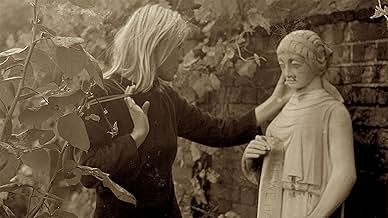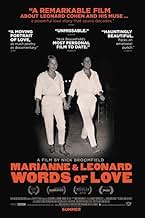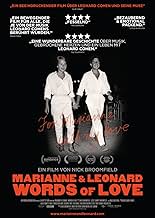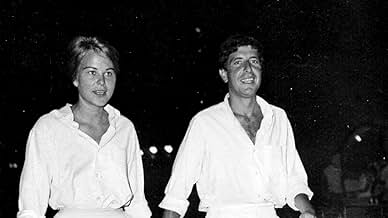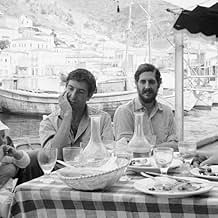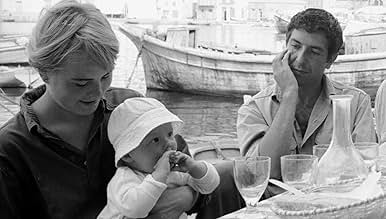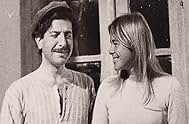अपनी भाषा में प्लॉट जोड़ेंAn in-depth look at the relationship between the late musician Leonard Cohen and his Norwegian muse Marianne Ihlen.An in-depth look at the relationship between the late musician Leonard Cohen and his Norwegian muse Marianne Ihlen.An in-depth look at the relationship between the late musician Leonard Cohen and his Norwegian muse Marianne Ihlen.
- निर्देशक
- लेखक
- स्टार
- पुरस्कार
- 2 जीत और कुल 4 नामांकन
- Self
- (आर्काइव फ़ूटेज)
- Self
- (आर्काइव फ़ूटेज)
- Self
- (आर्काइव फ़ूटेज)
- Self - Writer and Poet
- (as Richard Vick)
- Self
- (आर्काइव फ़ूटेज)
- Self
- (आर्काइव फ़ूटेज)
- Self
- (आर्काइव फ़ूटेज)
फ़ीचर्ड समीक्षाएं
It also leaves a great deal unsaid and hazy. The assumption is that the cultural moments of the day ( and the copious drugs) have blurred the stories in many many ways. Despite all of that it somehow brings the back story of Marianne and Leonard into focus in a very sweet way towards the end of the film.
A number of the interviewees are just plain great. Watch out forAviva Layton who seems to be uncredited but she deserves better.
In many ways this film could have been much better if we had got past the headlines. Archival footage is used but the viewpoint most of the time is very much the male point of view.
This much thoughtless behaviour seems highly paradoxical. The myth of the unreachable poet seems to have attracted considerable numbers of women to the Cohen fan club. They felt like they were being understood. But seems to me; if that were really true - the story would have turned out quite differently.
What lifts this film is the redemption towards the end when we see the famous letter from Leonard to Marianne. In his dying moments Leonard recognised the value of his connection with Marianne. Coverage of the 5 or 6 years in a Buddhist monastery definitely hints at a rebalancing of Cohens' personal life and perspectives.
All in all this is a rather gentle sideways look at a significant relationship but understandably it is overbalanced by the the celebrity aspects of the story.
Marianne herself is present in the story but mostly in a back handed compliment kind of way.
Leonard and Marianne spent almost a decade together on Hydra where Leonard wrote poetry, books, and songs and eventually left to pursue his career as a musician in the world beyond the isolation of the island. Leonard asked Marianne to join him in his life in Toronto, where things were never the same between them, and Leonard's appetite for women moved him out of Marianne's orbit, and she suffered for it, though their love remained.
I have mixed feelings about the film. Marianne was the inspiration behind "So Long, Marianne," "Hey, That's No Way to Say Goodbye," "Bird on the Wire," and "Moving On" from Thanks for the Dance, Cohen's posthumous 2019 album. I guess I hoped this movie might offer more insight into Marianne herself - who by all accounts was a kind and nurturing person, creative in her own right who sang, had aspired to be an actress, and was a painter later in her life; rather, it put Marianne into the uncomfortable, limiting box of "MUSE" for Leonard and others.
It seems her son Axel didn't fare well in this unstructured, free love environment, and Marianne was also affected as her love Leonard flew away to Toronto, New York, and the world stage. It's not a bad film, it just left me feeling sad for Marianne and Axel, whose life stories feel incomplete, and whose potential felt sadly squandered.
At the end of the film a documentary maker read a good-bye letter from Leonard to Marianne in hospital before she died of leukemia. It said, "Well Marianne, it's come to this time when we are really so old and our bodies are falling apart and I think I will follow you very soon. Know that I am so close behind you that if you stretch out your hand, I think you can reach mine. And you know that I've always loved you for your beauty and your wisdom, but I don't need to say anything more about that because you know all about that. But now, I just want to wish you a very good journey. Goodbye old friend. Endless love, see you down the road. Love and gratitude, Leonard."
My first young love was a musician and artist who I love to this day with all of my being, though circumstance drew us apart at the height of our romance. We are still connected, but we leave the past in a glass case on a high shelf so as to not to disturb those portraits of perfection we drew together. A letter from him in my last days would be a most cherished moment to sum up this depth of love from my tenure on this earth. Marianne radiated and glowed as Leonard's letter was read to her. It is a tremendously moving moment, and was worth the whole film to me.
The titular Marianne was a complex personality in her own right, already married with a child when she met Cohen and lived with him on an off for several years in what was an open relationship on both sides.
Some complained about Marianne not having been fleshed out because Cohen was a famous poet and songwriter, hence more important. From my point of view, whatever artistic aspirations Marianne might have had, it never developed into any worthy works. Not because anybody prevented her from "creating", but because of her own free will she went back to Norway at the end of the story and worked in an office for the rest of her life.
It's certainly not up to the audience to judge what sort of relationship Marianne and Leonard should have had. For sure, it was something that lasted until the end of their lives (very moving message sent by Cohen to the dying Marianne) and who's to say that it wasn't perhaps the most perfect relationship ever?
There were other women - many of them, sometimes more than one a day. Free Love, fueled by drugs - acid, uppers, downers - was just an excuse for promiscuity, but promiscuity was mandatory in the 1960s. And not without casualties: suicides and deaths from overdoses. Marianne had a son by her first husband, Axel, whom we see as a happy child on the island. Like other children of that era, he ended in an institution.
Cohen has given us some great songs, and his dark gravelly voice is one of the iconic sounds of the last sixty years, but Nick Broomfield's unflinching documentary paints a portrait of an egotistical, self-destructive man who took up women and dropped them as casually as a Kleenex.
Three months before he died and knowing death was coming, he sent a love-letter to Marianne who was in her final days. So maybe, the man had a heart. His songs seem to say so, but his life rather less so.
क्या आपको पता है
- ट्रिवियाA lot of the footage of the couple was shot by D.A. Pennebaker who had also stayed on the island of Hydra.
- भाव
Self, also narrator and interviewer: It was the 60s, in the time of free love and open marriage, including Leonard and Marianne's. I was a rather lost 20 year old visiting the island of Hydra when Marianne befriended me. For a short while, I became one of her lovers. She encouraged me to follow my dreams and she played me Leonard's songs under the Greek moon and stars. Her smile and enthusiasm were one of a kind and I fell completely intoxicated by the beauty of their relationship.
- कनेक्शनEdited from Ladies and Gentlemen, Mr. Leonard Cohen (1965)
टॉप पसंद
- How long is Marianne & Leonard: Words of Love?Alexa द्वारा संचालित
विवरण
- रिलीज़ की तारीख़
- कंट्री ऑफ़ ओरिजिन
- आधिकारिक साइट
- भाषाएं
- इस रूप में भी जाना जाता है
- Marianne & Leonard: Aşk Sözleri
- फ़िल्माने की जगहें
- Hydra, यूनान(island, main location)
- उत्पादन कंपनियां
- IMDbPro पर और कंपनी क्रेडिट देखें
बॉक्स ऑफ़िस
- US और कनाडा में सकल
- $10,12,034
- US और कनाडा में पहले सप्ताह में कुल कमाई
- $44,942
- 7 जुल॰ 2019
- दुनिया भर में सकल
- $33,11,263
- चलने की अवधि1 घंटा 42 मिनट
- रंग
- पक्ष अनुपात
- 1.78 : 1
इस पेज में योगदान दें








